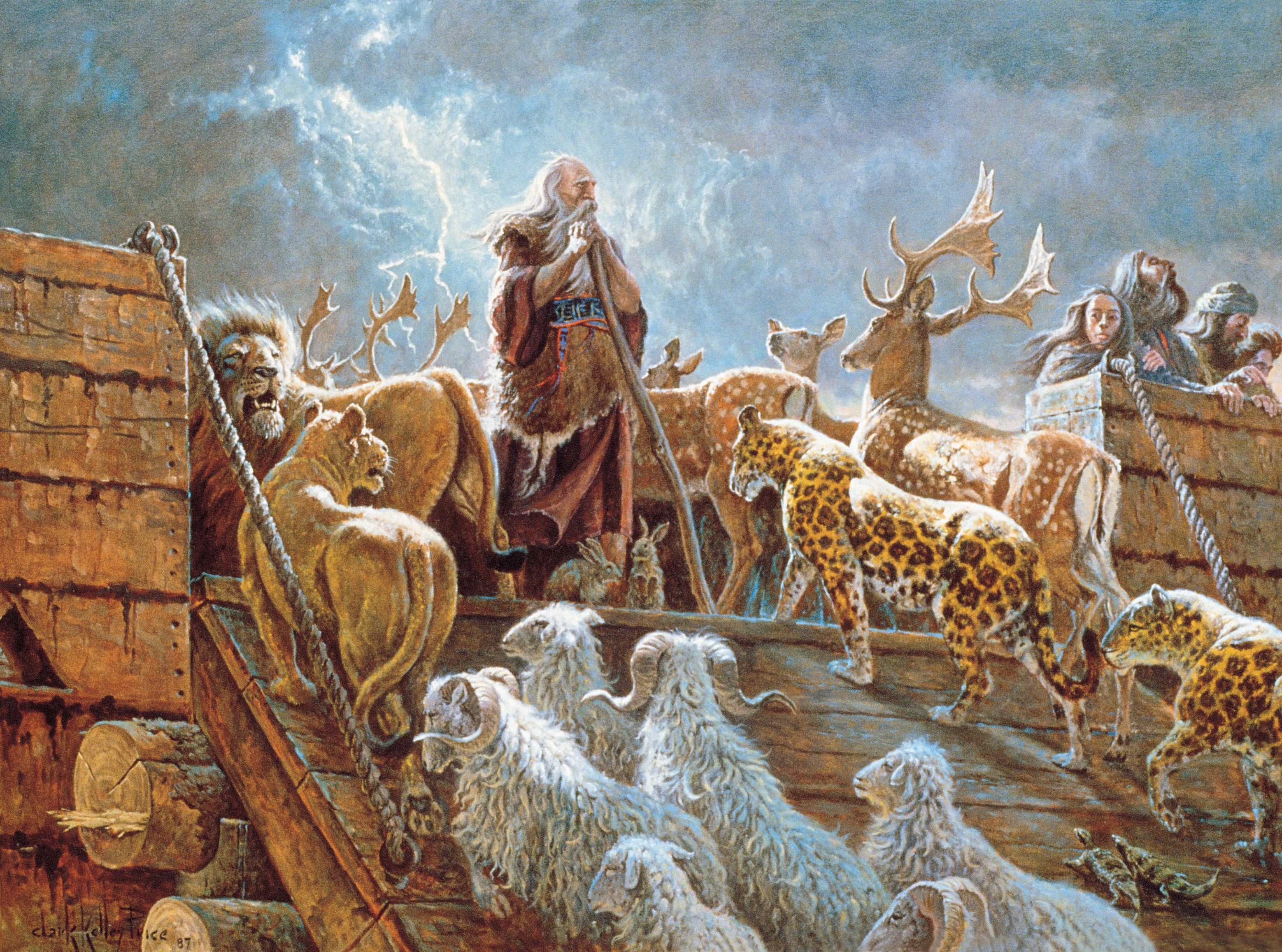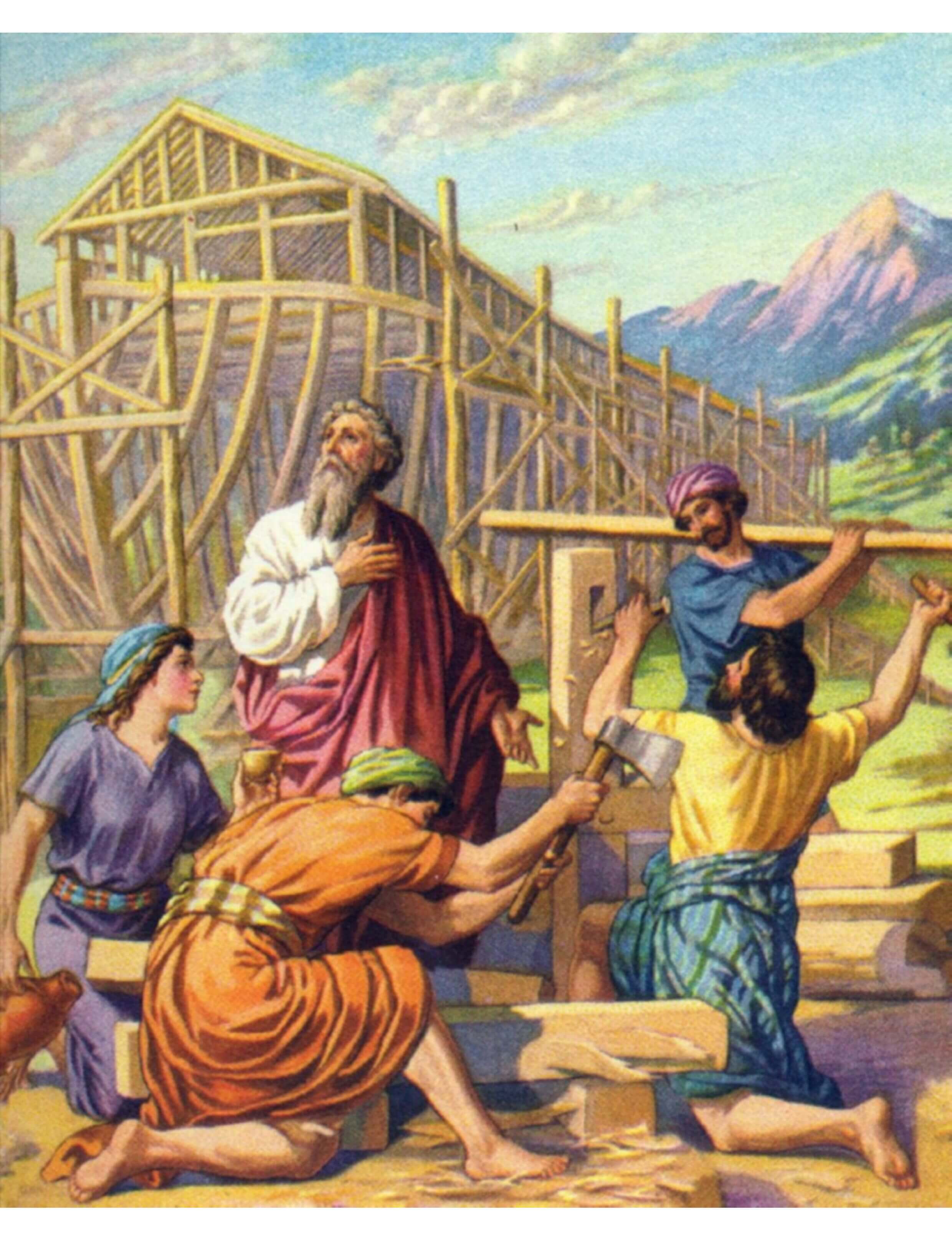Have you ever stopped to think about the people who truly leave a mark, the ones whose stories echo through the ages, shaping the very fabric of our shared beliefs? It's almost as if some figures are just so much more than a name; they are, in a way, pillars of ancient narratives, offering, perhaps, a sense of calm or a feeling of comfort, like the very meaning of their given name. This is, you know, very much the case for a figure who stands as one of the last great leaders before a truly immense change came upon the world, a person whose tale is told across so many different faith traditions.
This individual, often seen as a faithful helper to a higher power in a world that had, quite honestly, become a little bit messy and full of wrong turns, holds a rather central spot in one of the most famous stories ever told. He is, essentially, the main character in a truly epic tale of a great watery event found in an old, old book of beginnings. We are talking about someone who, incidentally, also brought about the practice of growing grapevines for their fruit, and who, as a family man, was the father to three sons who would, more or less, become the ancestors of many peoples.
His background, too, is quite interesting; he came from a line of people known for their deep spiritual connection, a lineage where, it was said, folks really started to reach out to and honor the divine. So, his coming into the world was, in some respects, the culmination of generations of this spiritual heritage, setting the stage for a story that, you know, still resonates with so many people today, offering powerful messages about how grace works and what it means to truly believe and follow through.
Table of Contents
- Who Was Noah - A Biographical Sketch
- What Made Noah Stand Out in His Time?
- How Did Noah's Actions Shape Future Generations?
- What Lasting Lessons Does Noah's Story Offer?
- Summary of Noah's Enduring Narrative
Who Was Noah - A Biographical Sketch
When we talk about foundational figures in ancient stories, Noah, sometimes called Noach, certainly comes to mind. He is, actually, the very last of those really old, old leaders who lived before a massive, world-altering event took place, according to the deeply held traditions of a number of faiths that trace their roots back to Abraham. He was, in essence, a person who lived a life of deep commitment and loyalty to a higher power, even though the world around him was, to be honest, pretty much full of people doing things that were not right. This makes his story, you know, quite compelling, especially when you consider the backdrop of his times.
This remarkable individual, often thought of as the central figure in the famous story of a great flood, which you can find detailed in the earliest book of the Old Testament, a book called Genesis, was also, interestingly enough, the person credited with starting the practice of cultivating grapevines. So, he was not just a spiritual leader, but also, in a way, a practical innovator. And, as a father, he had three sons—Shem, Ham, and Japheth—who are, pretty much, seen as the forebears of many different groups of people who came after them. His life, you see, touched upon so many aspects of what it means to begin again.
Noah's Personal Details and Early Connections
Noah's lineage is, arguably, a key part of his story. He was a descendant of Seth, a line of people who, as the ancient texts tell us, began to truly connect with and call upon the name of the divine. This suggests that his upbringing, or at least his family background, was steeped in a tradition of spiritual awareness and devotion. It was, in some respects, a generational unfolding, a long chain of individuals who carried forward a certain kind of spiritual torch, leading, ultimately, to Noah himself. His existence was, you know, a continuation of this very special heritage, a heritage that prepared him for what was to come.
His birth, too, holds a specific place in the ancient records. Noah was the firstborn son of a man named Lamech. He represented, essentially, the tenth generation of humankind on Earth. When Noah came into the world, his father, Lamech, was a rather mature 182 years old. The ancient writings also tell us what Noah's name actually means, hinting at "rest" or "consolation," which, when you think about it, is quite fitting for someone who would bring about a new beginning after a period of immense upheaval. His very name, then, carried a kind of promise, a whisper of peace after turmoil.
| Meaning of Name | Rest or Consolation |
| Lineage | Last of the antediluvian patriarchs; of the godly line of Seth |
| Parents | Son of Lamech |
| Generation | Tenth generation of man on Earth |
| Father's Age at Birth | Lamech was 182 years old |
| Age at First Son's Birth | 500 years old |
| Age at Flood | 600 years old (100 years after first son) |
| Key Roles | Hero of the biblical flood story, originator of vineyard cultivation, father of Shem, Ham, Japheth |
What Made Noah Stand Out in His Time?
In a world that, by many accounts, had strayed far from what was considered good and right, Noah stood as a truly unique figure. He was, quite simply, an obedient servant to a higher power, a beacon of faithfulness amidst a landscape that had, you know, become deeply entangled in wrongdoing. This distinction is, arguably, what set him apart and made him the chosen one for a monumental task. His commitment was, in a way, unwavering, even when faced with the pervasive unrighteousness that surrounded him. He maintained a moral compass that few others, apparently, possessed during that era.
Being part of the godly line of Seth meant that Noah was born into a heritage where spiritual connection was, basically, a defining characteristic. It was a time, as the ancient texts explain, when people truly began to reach out and acknowledge the divine. This deep-seated tradition, passed down through generations, likely shaped Noah's own spiritual inclinations and strengthened his resolve to walk a path of righteousness. His life was, in some respects, a living testament to the values that his ancestors had upheld, a continuation of a spiritual thread in a world that was otherwise unraveling.
Noah's Unique Relationship with Divine Guidance
Noah's story, more than just a recounting of events, actually embodies several very important messages found within the ancient scriptures. It speaks, for instance, about a higher power's just response to persistent evil, showing that actions have consequences, even on a grand scale. Yet, at the same time, it beautifully illustrates how grace, a kind of unearned favor, is extended through a solemn promise or agreement. This dual aspect—judgment and grace—is, you know, a central theme, highlighting the complexity of divine interaction with humanity.
Furthermore, Noah's experience serves as a powerful call to faith and to following instructions for those who are considered loyal. His life demonstrates that genuine belief is not just about inner conviction but also about outward actions, about doing what is asked, even when it seems, perhaps, extraordinary or difficult to comprehend. His divine selection was, in a way, a recognition of his unique character and his willingness to trust and obey, making his relationship with the divine guidance a truly singular one, a bond that shaped not only his destiny but also the course of history.
How Did Noah's Actions Shape Future Generations?
The tale of Noah is, without a doubt, most famously known for the great flood, an event that, in essence, reshaped the entire world. As the central figure, the hero of this incredible story, Noah's actions were not just about personal survival; they were, in fact, about the continuation of life itself. He was given a very specific set of instructions, and his diligence in following them led to the preservation of life on Earth, allowing for a fresh start. This act of building and gathering was, you know, a monumental undertaking, a true testament to his commitment to the task set before him.
Beyond the grand narrative of the flood, Noah also played a significant role in the practical aspects of human civilization that followed. He is, rather interestingly, recognized as the originator of vineyard cultivation. This means that after the world was renewed, he was the one who, basically, began the practice of growing grapes, a skill that would, of course, become a foundational part of agriculture and human culture. So, his impact was not just spiritual or historical; it was, in a way, very much about the everyday life and sustenance of the people who would come after him, setting a precedent for future generations.
The Enduring Impact of Noah's Relationship to the World
The story of Noah is, actually, deeply symbolic, especially concerning the promise made after the flood. The appearance of the rainbow, for instance, stands as a lasting sign of a solemn agreement, a pledge that such a widespread destruction would not happen again. This act of grace, extended through a covenant, is a powerful reminder of a higher power's enduring care and commitment to creation, even after judgment. It's a message of hope and renewal, a colorful sign in the sky that, you know, still speaks volumes about promises kept and new beginnings.
Noah's experience, too, underscores the vital importance of faith and of following instructions. His willingness to believe and act upon what he was told, even when it seemed, perhaps, incredible or counter-intuitive, is a central part of his enduring legacy. This call to faithfulness and obedience is, in some respects, a timeless lesson, inspiring people throughout history to trust in a greater plan and to live lives that reflect that trust. His relationship with the world, then, was not just about surviving a cataclysm; it was, basically, about establishing a new foundation built on a deep connection to purpose and belief.
What Lasting Lessons Does Noah's Story Offer?
Noah's story, as it has been passed down through countless generations, continues to shape modern ways of thinking and believing. His legacy is, essentially, woven into the fabric of many contemporary faiths and ethical frameworks, providing a rich source of contemplation on themes like justice, mercy, and the human response to divine will. It's a narrative that, you know, offers insights into how ancient events can still resonate powerfully in our current lives, influencing our understanding of the world and our place within it. His tale, you see, is far from just an old account; it is, in a way, a living tradition.
He is, quite rightly, seen as a crucial link, a bridge connecting the world that existed before the great flood, a world tied to the very first man, Adam, with the world that emerged afterward. His life, therefore, represents a pivotal moment in the unfolding
:max_bytes(150000):strip_icc()/Noah-GettyImages-91726956-58ef74065f9b582c4dff22be.jpg)

